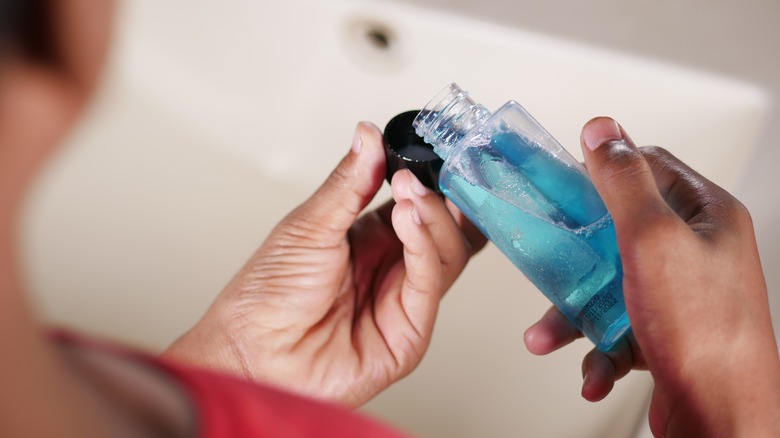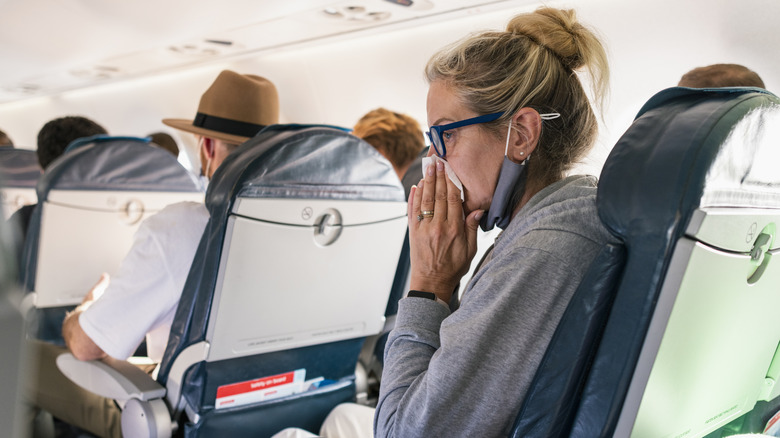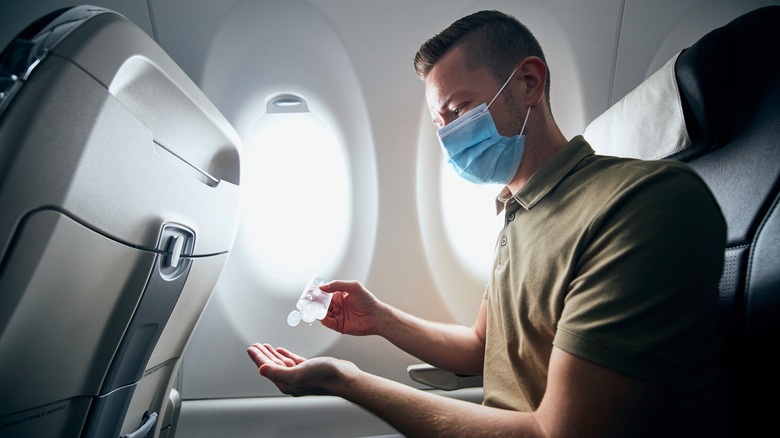Can Mouthwash Prevent You From Getting Sick On An Airplane? Here's What We Know
Even before COVID-19 was a concern, flying was always risky because of the possible spread of germs. Hundreds of people sat in close quarters from one another for extended periods of time — you do the math.
With the pandemic, this worry has increased significantly, which is why airlines are so careful with their health and safety protocols and people sometimes prep for days before attempting to fly across the world. You probably already know the basics of preventing sickness while on an airplane: wear a mask, use sanitizer, wash your hands, and just be mindful of hygiene.
Preliminary findings from a 2020 study done by Cardiff University researchers and published in the Journal of Lipid Research found that mouthwash can kill the coronavirus in 30 seconds. Three over-the-counter mouthwashes in particular were singled out as being most effective (via CTV News). The products in concern had cetylpyridinium chloride (CPC), ethanol with ethyl lauroyl arginate (LAE), and essential oils. Another study published in 2021 in the journal Pathogens had similar results. However, the clinic director of otolaryngology at Johns Hopkins Medicine, Dr. Nicholas Rowan thinks that research done under lab conditions might not hold true in the real world, per HuffPost.
More real-world research is needed before this claim is taken seriously
Researchers of the 2020 study themselves stressed the fact that the findings were preliminary and more research is needed before this theory can hold true, according to CTV News.
Geneticist Chana Davis said, via HuffPost, "I think this is a trend that we see over and over again in science ... just because something worked in a lab, in a very controlled experiment, doesn't always mean it's going to translate into the real world. And this just really hasn't yet been proven to move the needle in the real world." The studies done so far are small and short-term, per Medical News Today.
Plus, as Healthline reported, your throat is not the only place you should be thinking about when it comes to hygiene. Coronavirus is a concern in nasal passages too. So even if you were to rinse your mouth with mouthwash whatever chance you got on an airplane and kill off any viruses there, you'd still be carrying some in your nose. Per Davis, you can still spread the virus via the simple act of breathing (via HuffPost). "The issue is ... that most transmission is through your exhaled breath, and so by washing your mouth, you're not getting rid of the virus in your lungs that you're then exhaling into the world," explained the scientist.
What does this mean for airplane hygiene?
Experts believe that the tried and trusted methods still hold true when it comes to preventing sickness while flying. "Wash your hands if you're not feeling well then stay home. If you're coughing, sneezing, having some symptoms then wear a mask [and] if you're in environments where you're worried about potential exposures, then masking is a great idea," explained Dr. Nicholas Rowan (via HuffPost).
There is also such a thing as the best place to sit on a plane if you want to stay healthy. According to a 2018 study published in the journal Proceedings of the National Academy of Sciences (PNAS), the window seat is your best bet if you want to stay safe. Co-researcher and professor at the Nell Hodgson Woodruff School of Nursing, Vicki Stover Hertzberg shared (via The Sun), "Get in that window seat and don't move." Sanitize your tray tables if you can too and avoid touching the germiest spots on an airplane: tray tables, seats, armrests, and headrests. In fact, a sanitizer can be your best friend on an airplane.
It won't hurt to give your immune system some extra protection either. Avoid sugary treats, hydrate well, and eat nutritious meals. As for the mouthwash, it won't hurt to carry a travel-sized version anyway. Even if it doesn't kill off viruses, it can still keep your breath smelling minty fresh.



